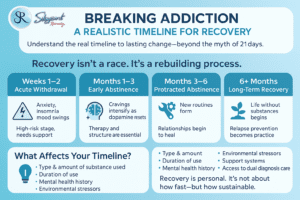Recovery isn’t one-size-fits-all. Learn the real timeline for breaking addiction, why it’s more marathon than sprint, and how Skypoint Recovery can help you cross the finish line.

The Myth of “21 Days”: Why Breaking Addiction Takes More Than Willpower
Some say it takes 21 days to form a habit. That might apply to drinking more water or taking the stairs, but not to breaking drug addiction or alcohol dependence. When you’re up against a cycle that’s wired into your brain and tied to pain, trauma, and repetition, you’re rewiring your entire nervous system.
Addiction affects the brain’s reward system, stress response, and decision-making pathways. Even after someone stops using, the brain continues healing for months, sometimes years. That’s why breaking an addiction takes more than grit. It takes structure, support, and time.
Understanding the Stages: What Happens as You Break Free
No two people walk the exact same path, but most go through five major stages of addiction recovery. These stages reflect shifts in mindset and behavior, not just time on a calendar.
- Pre-contemplation: Not ready to change yet, even if others are concerned.
- Contemplation: Thinking about it. Maybe even Googling articles like this one.
- Preparation: You’re gathering information, considering treatment, and weighing options.
- Action: You’ve taken the leap. This is where therapy, support, and structure begin.
- Maintenance: You’re rebuilding life with healthier habits and staying vigilant.
Each stage brings emotional highs and lows. Early on, anxiety and withdrawal symptoms may be overwhelming. Later, boredom and overconfidence can trigger setbacks. Understanding where you are (and what comes next) is key to staying grounded.
The Realistic Timeline: What to Expect Week by Week and Month by Month
You can’t set a stopwatch on addiction recovery timeline. But you can understand its phases.
Weeks 1–2: Acute Withdrawal
This is the toughest stretch. The body reacts to the absence of substances with anxiety, insomnia, and mood swings. Whether it’s alcohol addiction recovery or stimulant use, the first days are about stabilization and support.
Months 1–3: Early Abstinence
Cravings can spike as the brain’s dopamine levels slowly stabilize. This is a high-risk time for relapse. You’re learning to navigate triggers without numbing them.
Months 3–6: Protracted Abstinence
New routines take shape. Sleep improves. Relationships begin healing. But the brain is still vulnerable. This is where structure matters: outpatient addiction treatment and sober housing help prevent drift.
6 Months and Beyond: Long-Term Recovery
Life gets fuller and more complex. You’re growing, but also facing normal stress without a buffer. Relapse prevention becomes a practice, not a rulebook.
What affects the timeline?
- Type and amount of substance used
- Length of time using
- Mental health history
- Family or environmental stress
- Personal support system
- Access to care like Dual Diagnosis Treatment
Why Professional Support Makes All the Difference
You don’t have to map out recovery alone. While some people attempt to self-manage, the reality is, support works better.
Therapy helps you untangle the emotional roots of addiction. Group settings provide peer encouragement. And structured programs like PHP or IOP make sure you’re not just stopping use, but building a new life.
At each stage, support means different things. For some, it’s a daily schedule. For others, it’s the quiet consistency of sober living. Recovery means healing.
Relapse Isn’t Failure: Staying on Track for the Long Haul
Relapse isn’t rare. It’s part of the path for many. It can feel defeating, but it’s not the end. It’s feedback.
Here’s how people build strength after setbacks:
- Naming the trigger: Was it stress? Loneliness? Overconfidence?
- Doubling down on therapy and accountability
- Rebuilding healthy routines and cutting ties with high-risk environments
What matters is how you respond. Real growth often happens in the comeback, not the climb.
Ready to Start Your Journey? Why Skypoint Recovery Is Akron’s Choice
Recovery happens in community, not isolation. Skypoint Recovery in Akron, Ohio understands that, “How long does it take to break an addiction” isn’t the right question. The better question is: “What support do I need to make this journey sustainable?”
Our holistic approach recognizes that every person’s path looks different. Whether you need the structure of a Partial Hospitalization Program, the flexibility of an Intensive Outpatient Program, or the community that sober living offers, they meet you where you are.
Skypoint Recovery works with Medicaid insurance and helps people figure out their financial options. The staff understands that asking for help takes courage, and they’re committed to removing barriers that keep people from getting treatment.
Breaking addiction is possible, and you don’t have to do it alone. The first step is reaching out. Whether you fill out our online form or call 330-422-4947, someone is ready to help you figure out your next move. Your recovery timeline starts with that first conversation.
Related Blogs
-
Building Coping Skills: Replacing Trauma-Driven Substance Use with Healthy Strategies
-
Evidence-Based Therapies for Treating Trauma and Addiction Together
-
Trauma-Informed Care in Addiction Treatment: What It Looks Like in Practice
-
How Childhood Trauma Increases the Risk of Substance Use Disorder
-
The Impact of Trauma on Addiction and How Recovery Addresses It


Freedom Is Just a Call Away
Skypoint Recovery offers personalized treatment programs led by experienced professionals who understand your journey. We’ll help you build the foundation for lasting recovery through evidence-based care tailored to your needs. Your path to healing awaits – reach out for a confidential consultation.









